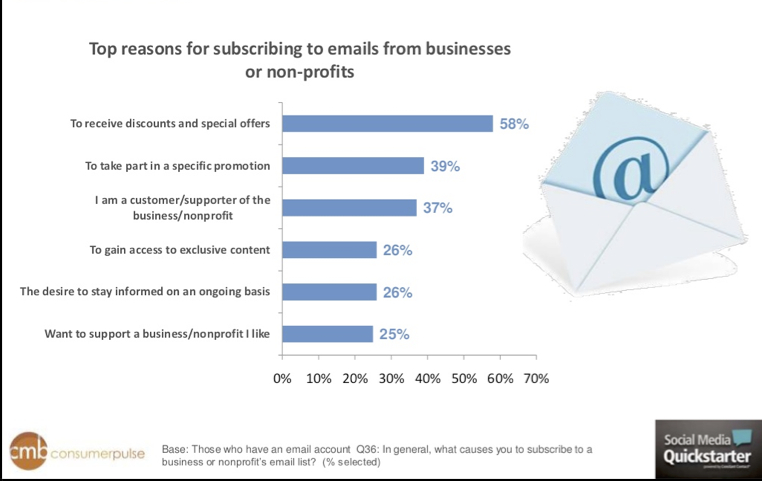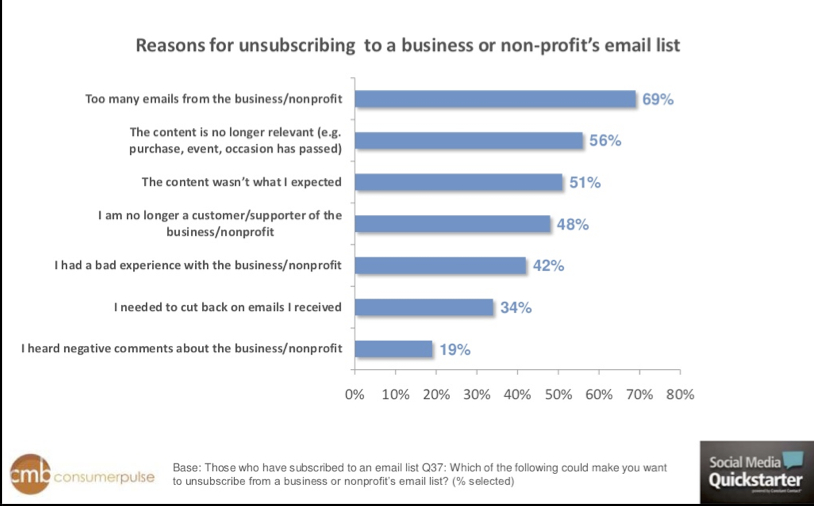 You’ve just sent out an amazing email campaign, but over the next few days, you watch as the opt-outs grow and grow. You start worrying. Should I clean my list? Should I dump the campaign and start over? Should I survey my subscribers to find out what’s going on?
You’ve just sent out an amazing email campaign, but over the next few days, you watch as the opt-outs grow and grow. You start worrying. Should I clean my list? Should I dump the campaign and start over? Should I survey my subscribers to find out what’s going on?
We’ve all been there. Opt-outs happen even to the best email marketers. Here’s the good news: A few opt-outs here and there shouldn’t strike terror in your heart. In fact, Constant Contact suggests that an opt-out rate as high as 2 percent is actually normal for an email campaign.
Here’s the bad news: If you’re seeing spikes in your opt-out rates, it could be a sign that something just isn’t working. Here are some places to look if you’re having an opt-out issue.
Why Do Subscribers Opt-in?
When looking at your opt-outs, it’s important to remember why your subscribers opted-in in the first place. According to research conducted by Social Media Quickstarter, your subscribers didn’t sign up for your email list just to obtain discounts; they want to deepen their relationships with you, too.

So Why Do Subscribers Opt-out?
Unsurprisingly, the top three reasons given for unsubscribing to a list reflect the opposite angles of the above opt-in reason list: receiving too many emails, receiving content that’s not relevant to the subscriber or receiving content that was not what the subscriber was expecting.

What Can You Do to Keep Your Subscriber?
Fortunately, there are some simple steps you can take to minimize opt-outs and maintain a dedicated, engaged audience.
Take a Closer Look at Your List
Is your list new or has it grown from a recent promotion or campaign? A period of higher opt-out rates can often be expected. However, if the opt-outs seem disproportionate, then your list might not be as clean or accurate as you need it to be. If that’s the case, data hygiene is your solution.
Take a Closer Look at the Content You’re Sending
It’s critical that you take the time to develop the right content for your audience. Try asking your subscribers what they want from you, either through a preference center or by sending a survey to your existing list. Also, always be sure to set clear expectations up front during your onboarding process and follow through with delivering the content you promised. (You are sending out a stream of welcome emails, aren’t you?)
Take a Closer Look at the Frequency of Your Mailings
Hand in hand with your content, consider how often you send emails and the appropriate frequency for your subscribers. Sending daily or even weekly emails requires fresh and distinctive content or your readers will quickly tire of it. The lifecycle of your products or services can also be an influencer. For example, active investors are interested in daily market updates, whereas few people buy flowers every day or week.
Take a Closer Look at the Opt-out Process
Give subscribers the ability to reduce the amount of mail they receive by way of their subscription preferences, rather than an all or nothing opt-out. And always ask readers why they’re opting out. Their answers might surprise you. Remember, if you don’t ask, you’ll never know for sure. Then, use this insight to tweak your future campaigns and hopefully you’ll see better results in no time.
Curious to see how better intelligence can help you get even bigger results out of your email list? Request our free Email Intelligence Test to learn more!
Photo Credit: Alexandre Normand
 Affiliate Marketing
Affiliate Marketing Automotive
Automotive eCommerce and Retail
eCommerce and Retail FinTech
FinTech LeadGen
LeadGen Nonprofit and Political
Nonprofit and Political Payments
Payments Technology Platforms
Technology Platforms Tourism and Hospitality
Tourism and Hospitality
 You’ve just sent out an amazing email campaign, but over the next few days, you watch as the opt-outs grow and grow. You start worrying. Should I
You’ve just sent out an amazing email campaign, but over the next few days, you watch as the opt-outs grow and grow. You start worrying. Should I 

